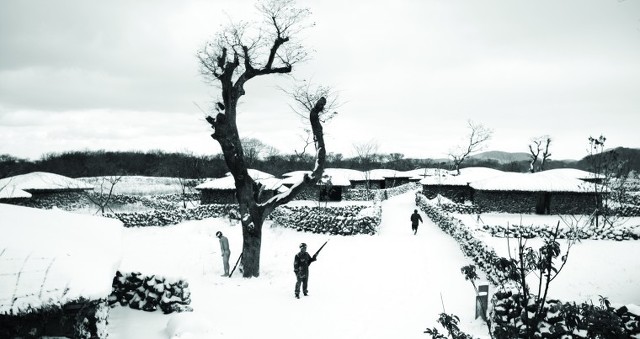 Artful incoherence in depicting Korean War atrocity
Artful incoherence in depicting Korean War atrocity As a Sundance account puts it, "
Jiseul the film is a condensed, fragmented and lyrical account of a particular episode in Jeju Island's history: that of 1948, in which US-backed South Korean troops were ordered to treat everyone living 5 km beyond the mainland as communist rebels, and to execute them on sight." Unfortunately this shocking series of events, part of a brutal anti-communist purge, which certainly are "fragmented" in the film -- so much so you get no clear notion of what is going on -- is more suited to straightforward historical treatment than to the artful recasting this director gives it. There would have been plenty of drama in the flight and hiding of the villagers and the brutality of the local military, directed (according to the film) by US authorities to massacre the inhabitants of an island as "communists," without the need for the overbearing, portentous music, incoherent chronology, poetic and incomprehensible section headings, and exaggerated amateur acting. None of this can be smoothed over by the gorgeous black and white cinematography, though its beauty cannot be denied, especially in some opening landscape images worthy of, at the least, Ansel Adams. (The eye is arguably fresher and more unconventional than Ansel's.)
Jiseul is indirect, dramatic and austere and would make a lot of sense as an abstract cinematic art piece. That must be why it was welcomed at Sundance and won the World Cinema Dramatic Jury Prize there, and it will doubtless turn up on other festivals for some time to come. I have rarely seen more beautiful black and white on screen landscapes. But the trouble is,
Jiseul makes no sense. It does not communicate. It does not tell its story. And so it does not do justice to events in living memory -- despite the fact that the filmmaker, O Muel, is a Jeju native, from the island of these events. What is peculiar is that though the 109 minutes of the film would have been long enough to outline what happened, it is really only from opening and closing titles that we get some explanation. O Muel does not know how to tell a story. He could have included all the elements here: the brutal military, torturing to death a new recruit in the freezing weather; the old lady who refuses to leave home; the farmer who insists on going back from the cave retreat to feed his hog; the cramped conditions in the cave hideout; the wild young men running around risking death; the captured young woman, and so on. But all this needed to be included in a framework that would make sense out of a sequence of events. This is not a visual poem. It's history.
Reports indicate that up to 30,000 died in this cold spring pogrom. But that's lost. Here we get to see only a mere a handful of people, maybe a couple dozen in all. The whole thing feels like a stage production -- through with the undeniable additional visual natural grandeur stark location shooting permits. As Justin Lowe of
Hollywood Reporter wrote in his Sundance
review, the result is a film that is "lovely to look at but enervating to watch."
Jiseul (the name refers to potatoes that are referred to in an early scene, though that like so much is not properly followed through on) is a profoundly frustrating and disappointing experience. The reviewer who raved that
Jiseul "challenges the grammar of film" may have a point; there is talent here. But there is such a thing as a duty to the grammar of history and of narrative. Writing of
Jiseul Michael Pattison on his site
idFilm agrees with my assessment: "Given that mention of the massacre re-enacted here was illegal in South Korea for half a century after it occurred - and given the US government's own sustained silence on the matter, as the film itself tells us at its end - the material demands a more anchored framework, one by which a fuller historical understanding would accommodate a more cogent condemnation of both the national regime and the role played by the US in backing it."
Jiseul debuted at Pusan and was shown at Sundance, as mentioned, also at Rotterdam. Screened for this review as part of the MoMA-Film Society of Lincoln Center series New Directors/New Films (March 2013).





